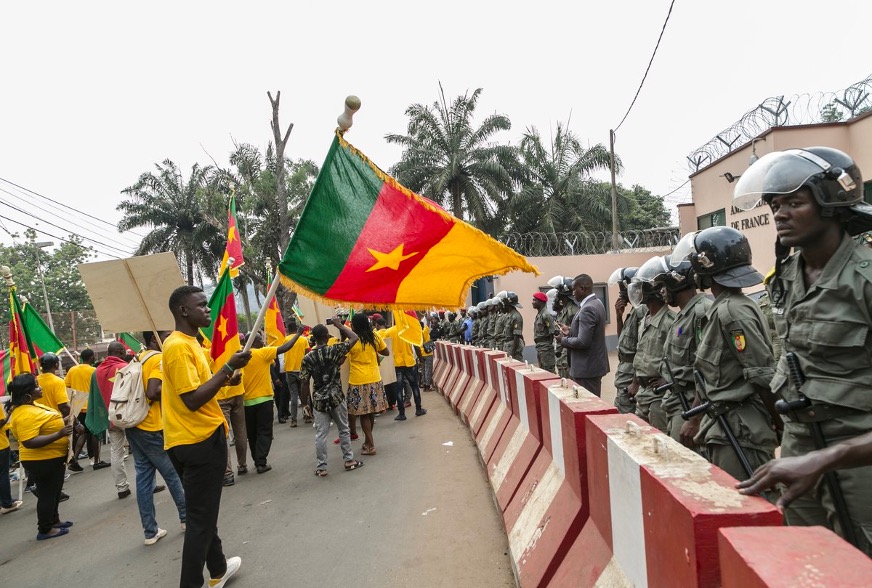Secondary menu
Working Group: Cameroon Anglophone Crisis Database of Atrocities
By: Julia Cappellacci (2L) and Eric Li (2L)
Leads: Julia Cappellacci (2L), Eric Li (2L)
Members: Jasmine Anthony (2L), Daniel Edmeades (1L), Lauren George (2L), Julian Greco (2L), Emily Hean (2L), Jamie Oneschuk (1L), Ella Ryu (1L), Nicolas Williams (2L)
The ongoing civil war in Cameroon has claimed the lives of over 4,000 civilians and has displaced over 700,000 people. Yet, the Cameroon Anglophone crisis remains underreported in the media and neglected by the international community, resulting in a deficiency of much needed humanitarian assistance for those caught in the crossfire. The current atmosphere of mistrust in Cameroon has further restricted the spread of information, as civilians are deterred from posting their experiences on social media out of fear of reprisals from various armed factions.
In light of this oppressive environment, the Cameroon Anglophone Crisis Database of Atrocities (“the Database”) serves as an apolitical and non-partisan platform for the collection and verification of evidence regarding war crimes and rights abuses perpetrated during the conflict.
It is important to shed light on the Cameroon Anglophone Crisis as it is one of the most underreported conflicts in the world. In fact, the conflict was declared to be the most neglected displacement crisis by the Norwegian Refugee Council (“NRC”) in 2019. Having already been considered an underreported conflict in 2019, neglect of the Anglophone Crisis has only been exacerbated by the ongoing Russian invasion of Ukraine, which has garnered mass coverage by the media and zealous responses from the international community. As the Secretary General of the NRC stated, “humanitarian assistance should be given based on needs, and needs alone. However, every day millions of displaced people are neglected because they have been struck by the wrong crisis and the dollars have dried up.”
Overview of the Cameroon Anglophone Crisis
While Cameroon is officially a bilingual country with both English-speaking and French-speaking regions, Francophones make up a large majority of the population (roughly 80 percent). In 2016, Anglophone lawyers and teachers began to protest the government’s appointment of Francophone civil law judges to common law courts in the English-speaking regions. The government responded to these protests with force, imprisoning protesters and restricting internet access. As the violence escalated, the protests began to evolve into a separatist movement, culminating in the declaration of an independent state of Ambazonia in 2017. As the government and separatists clashed, forces from both sides have engaged in extrajudicial killings, torture, and attacks on civilians, resulting in a massive humanitarian crisis as thousands are forced to flee from the endless violence.
The Database of Atrocities
The Database was established in December 2019 and is currently led by Billie Burton, a graduate student at the Fletcher School of Law and Diplomacy and geographic information system (GIS) analyst and Brian Silverman, a Professor at the Rotman School of Management. The database is apolitical and will avoid all partisan influence. To ensure neutrality and cybersecurity, the Database is hosted in Canada at the University of Toronto. Since its establishment, the Database has recorded over 800 incidents and has securely stored over 2000 pieces of digital evidence.
Partners of the Database
In addition to the working group at the University of Toronto, the Database has partnered with researchers from Leiden University, the University of Exeter, and the Edinburgh International Justice Initiative. The Database has also worked with rights-advocacy organizations such as the Centre for Human Rights and Democracy in Africa (CHRDA), the Human Rights Center at the University of California, Berkeley, Bellingcat, Human Rights Watch, and Amnesty International.
Objectives of the Working Group
By collecting and verifying evidence of war crimes and other human rights violations, the Database aims to:
- Counter the culture of impunity that has pervaded this crisis since it began in 2016;
- Secure evidence for future domestic and international accountability procedures and a possible national truth, justice, and reconciliation process;
- Assist human rights activists and journalists advocating for human rights in Cameroon;
- Constitute an archive for scholarly research on Cameroon and the Anglophone Crisis and conflict; and
- Serve as a deterrence to warring parties from engaging in further atrocities.
Contributions of the Working Group
Students in the working group use open-source intelligence (OSINT) methods to authenticate digital evidence submitted to the Database. This work entails using satellite imagery, archived weather and solar positioning data, social media, and other online tools to confirm whether the incidents depicted in the digital evidence indeed took place at the alleged time and location. These findings are then compiled in reports.
The 2021-2022 IHRP working groups completed the following reports, which were published in the fall:
Burning and Looting in Tashem Village, Bui (October 2021) — here
Burning of Buildings in Kikaikom (October 2021) — here
Forced Stripping Naked of Students in Buea (January 2022) — here
Burning of Queen of the Rosary College, Oyokong, Mamfe (February 2022) — here
IHRP summer volunteers teamed up with volunteers at the University of Exeter to complete two additional reports:
Attack on Mbonhong Village, Ndu (April 2022) — here
Attack on Pia Market, Fondonera (July 2022) — here
